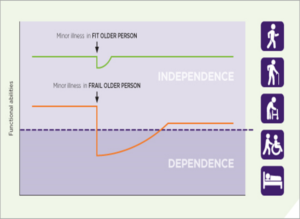What is Frailty?
-

www.england.nhs.uk, reproduced with permission
Frailty is a distinctive state related to the ageing process but it is not an inevitable consequence of ageing [1]. Not all older people are frail and not all people living with frailty are old; younger people with complex needs can also be classified as frail, although the majority of those living with frailty are old.
- Frailty is related to but distinct from ageing, co-morbidity and disability. As multiple body systems gradually lose their in-built reserves (physical and psychological), people start to develop frailty, making them vulnerable to sudden changes in their health and social needs [2]. These changes are often triggered by seemingly small events such as a change in medication or a breakdown in carer support.
- A person with frailty therefore typically presents in crisis with a fall, confusion or the inability to walk. These presentations are examples of the ‘classic’ frailty syndromes [2].
- NHS England has defined frailty as a progressive, long term health condition characterised by a loss of physical and/or cognitive resilience. Therefore, people living with frailty can deteriorate unexpectedly and do not recovery quickly after a simple illness or other stressful event [3].
- British Geriatrics Society. Fit for Frailty. Part 1. Consensus best practice guidance for the care of older people living in community and outpatient settings. 2014. http://www.bgs.org.uk/campaigns/fff/fff_full.pdf
- NHS England. Safe, compassionate care for frail older people using an integrated care pathway: Practical guidance for commissioners, providers and nursing, medical and allied health professional leaders. 2014. https://www.england.nhs.uk/wp-content/uploads/2014/02/safe-comp-care.pdf
- NHS England. Older People Living with Frailty. https://www.england.nhs.uk/ourwork/ltc-op-eolc/older-people/frailty/




